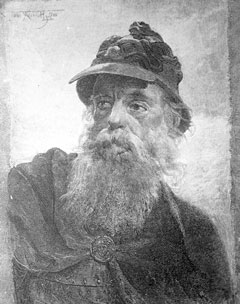Battle of Fort Loyal
| Battle of Falmouth (1690) | |||||||
|---|---|---|---|---|---|---|---|
| Part of King William's War | |||||||
 Baron de St Castin |
|||||||
|
|||||||
| Belligerents | |||||||
|
New France Wabanaki Confederacy |
|
||||||
| Commanders and leaders | |||||||
|
Joseph-François Hertel de la Fresnière Baron de St Castin Chief Hopehood (Kennebecks) Rene Robinau de Portneuf Augustin Le Gardeur de Courtemanche |
Captain Sylvanus Davis | ||||||
| Strength | |||||||
| 400-500 troops and natives | unknown | ||||||
| Casualties and losses | |||||||
| unknown | 200 killed | ||||||
Not to be confused with the Battle of Falmouth (1703)
The Battle of Falmouth (also known as the Battle of Fort Loyal) (May 16–20, 1690) involved Joseph-François Hertel de la Fresnière and Baron de St Castin leading troops as well as the Wabanaki Confederacy (Mi'kmaq and Maliseet from Fort Meductic) in New Brunswick to capture and destroy Fort Loyal and the English settlement on the Falmouth neck (site of present-day Portland, Maine), then part of the Massachusetts Bay Colony. The commander of the fort was Captain Sylvanus Davis. After two days of siege, the settlement's fort, called Fort Loyal (sometimes spelled "Loyall"), surrendered. The community's buildings were burned, including the wooden stockade fort, and its people were either killed or taken prisoner. The fall of Fort Loyal (Casco) led to the near depopulation of Europeans in Maine. Native forces were then able to attack the New Hampshire frontier without reprisal.
The earliest garrison at Falmouth was Fort Loyal (1678) in what was then the center of town, the foot of India Street. During King William's War, on Major Benjamin Church's first expedition into Acadia, on September 21, 1689, he and 250 troops defended a group of English settlers trying to establish themselves at Falmouth, Maine (present-day Portland, Maine). Natives killed 21 of his men; however, he was successful and the natives retreated. Church then returned to Boston, leaving the small group of English settlers unprotected. Hertel was chosen by Governor Frontenac to lead an expedition in 1690 that successfully raided Salmon Falls on the Maine-New Hampshire border, and then moved on to destroy Fort Loyal on Falmouth Neck (site of present-day Portland, Maine).
...
Wikipedia
